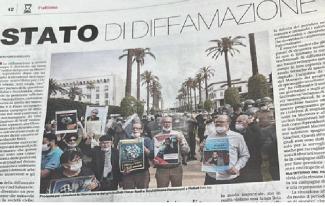
Rome (Italy) 19 January 2025 (SPS)- Italian newspaper, El Manifesto, published an article Today, by Sahrawi human rights defender and Mr. Mohamed Dihani, shedding light on the intersection of defamation and repression in Morocco and Western Sahara.
Dihani, himself a former political prisoner and victim of years of torture and persecution in Moroccan jails, reveals how Moroccan authorities have weaponized defamation and digital espionage to suppress dissent and silence voices critical of the Moroccan colonialist and corrupt regime.
The article focuses on the case of Aziz Ghali, President of the Moroccan Association for Human Rights, who became the target of an intense smear campaign for speaking out on Western Sahara—a territory considered "occupied" by the United Nations.
According to Dihani, the Moroccan government mobilized state-aligned media and online "trolls" to accuse Ghali of treason, directly threatening his physical safety and discrediting his advocacy for human rights.
Dihani argues that defamation has become a key tool in the Moroccan state’s arsenal of repression, targeting activists, journalists, and public figures who challenge the regime’s stance on sensitive issues, including corruption, the monarchy, and the ongoing occupation of Western Sahara.
He details how thousands of websites and social media accounts, many linked to Morocco's security apparatus, attack Sahrawi and Moroccan activists and journalists, often leading to their imprisonment.
One such example is the Gdeim Izik case, where 19 Sahrawi activists and journalists received heavy sentences, including life imprisonment, after participating in a peaceful protest in 2010.
These actions, Dihani contends, represent an extension of Morocco's systematic repression, which is now bolstered by advanced surveillance technologies such as the Israeli-made Pegasus spyware.
Reports by Amnesty International and Human Rights Watch confirm that Pegasus has been used to monitor not only Moroccan journalists and activists but also high-profile international figures, including French President Emmanuel Macron and Spanish Prime Minister Pedro Sanchez, Dihani indicated.
The article also highlights the plight of journalist Soulaiman Raissouni, who was jailed for five years after facing a barrage of defamatory attacks for his anti-corruption reporting. Although recently released on royal pardon, Raissouni continues to face threats and harassment, underscoring the precarious state of press freedom in Morocco.
Similar fates have befallen journalists Omar Radi and Taoufik Bouachrine, further demonstrating how the independent press has become a prime target for state repression.
According to Dihani, Morocco’s defamation campaigns are not random acts by rogue media but a state-sanctioned strategy designed to intimidate critics, spread misinformation, and erode public trust in journalism.
These measures are reminiscent of the "Years of Lead," the brutal era of repression under King Hassan II. Despite initial hopes by Moroccans for reform under King Mohammed VI, Dihani asserts that the current regime has intensified its control, employing digital surveillance and propaganda to stifle dissent more effectively.
Dihani concludes by lamenting the dire situation faced by activists and journalists in Morocco and Western Sahara, many of whom have fled to Europe seeking asylum.
As a Sahrawi exile himself, he remains in limbo, awaiting international protection while continuing to call attention to the abuses endured by his people.
Dihani’s account is a sobering reminder of the challenges faced by those who dare to speak out against oppression and highlights the urgent need for global action to support human rights defenders in Morocco and Western Sahara. (SPS)
090/500/60 (SPS)